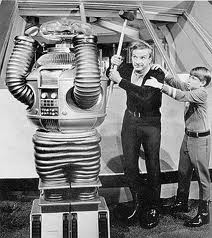Watch any old sci-fi movie, and the future is invariably
depicted as a place full of helpful, hard-working robots, busying themselves
with the household chores, while the humans sit around mixing cocktails and
enjoying themselves. Funny, it never seemed to materialize. If anything, we all
seem to be working harder than ever, tied to our smartphones and e-mail.
Finally, however, the advances in artificial intelligence
are so rapid and so significant that robots may finally make their way in
everyday life. Such as? Google is working hard on its driverless car. Samsung
has launched a robotic vacuum. At the same time, robots and machines are
quickly learning how to perform simple surgical operations, process basic legal
documents, teach people how to speak a foreign language, and even write articles
(although not as well as humans, I hasten to add).
In a new book called “Robot Futures,” Illah Reza Nourbakhsh,
the professor of robotics at Carnegie
Mellon University

No comments:
Post a Comment